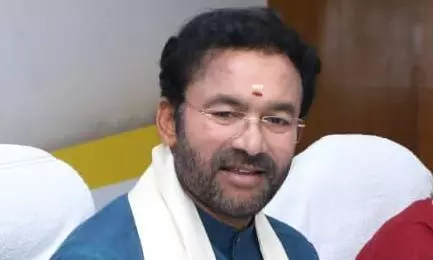Congress disavowed civilisational heritage, says Kishan Reddy

Hyderabad: Union Minister of Coal and Mines G Kishan Reddy on Tuesday said that India’s independence was more than just a date on the calendar a defining moment in the life of every Indian.
“After a struggle against 800 years of invasions and foreign colonialism, our immediate goal was to channelise our energies into creating the framework to enable a lasting and resilient democracy. That moment of real liberation arrived when we sowed the seeds that could cater to the aspirations of the people and immortalized our values, our vision, and our ideals in the Constitution of India on 26th November 1949,” he said.
Speaking on the occasion of celebrations organized in connection with 75th anniversary of the adoption of the Constitution, he said as India celebrates its 75th year of becoming a constitutional republic, this is an opportune moment to revisit some of these values and ideas.
According to Reddy, it is abundantly clear that the Constitution has not only emerged as the custodian of core values and collective consciousness, but a trusted companion growing and evolving with a dynamic and aspirational Bharat.
Embodying this unique synthesis, the Constitution has truly functioned as a living document by both adapting to the changing times yet reinforcing defining values time and again. This masterful blend of need for flexibility and protecting core identity was woven into the very essence of the Constitution.
The thinking and deliberations that went into creating Constitution is preserved in the illuminating Constituent Assembly debates. Although a newly independent country, ravaged by years of colonialism and invasions, the Constitution reiterated that India wasn’t starting from scratch but building upon a rich civilizational heritage and inherent wisdom.
In a speech, delivered on 18th September 1949, Kallur Subba Rao, a freedom fighter and member of the Indian National Congress while participating in a debate on Article 1 of the Constitution, reiterated support for the name Bharat as it is mentioned in the Rig Veda. His words reaffirmed that the name Bharat is not merely symbolic but steeped in millennia of our collective heritage.
But Today’s Congress party and their leaders have however disavowed this civilisational heritage. Across several platforms, including in various fora abroad, they have called India the outcome of a “negotiated settlement”. If only they had read the assertions of B.R Ambedkar during the debate on 4th November 1948 where he had made it amply clear that India was one ‘indestructible unit’, where people may be divided into different states for convenience of administration, but the country is one integral whole whose authority is derived from a single source.
This wisdom and vision led to the Constitution's inherent dynamism and a flexible perspective allowing India to grow as a nation, drawing its power and stability from deep-rooted core values. A compelling example of the Constitution’s inherent flexibility is when Dr. B.R. Ambedkar resisted including the word "socialist" in Article 1 of the constitution that currently, stands as “India, that is Bharat, shall be a Union of States” and defended his stance by saying, ‘What should be the policy of the State, how the Society should be organised in its social and economic side are matters which must be decided by the people themselves according to time and circumstances.’
On November 25, 1949, in his final speech, a day before the Indian Constitution was adopted, Dr. Ambedkar said that political democracy cannot last without ‘social democracy’. In his view, social democracy was a way of life which recognizes liberty, equality and fraternity as the principles of life. These very principles are being embodied in the transformational agenda of Prime Minister Narendra Modi. Since 2014, he has been guided by the mantra of ‘Sab Ka Saath Sab Ka Vikas Sab Ka Vishwas, Sab Ka Prayas’ and this is visible in every decision of the government.
Under the leadership of Prime Minister Modi, initiatives such as Swacch Bharat, Pradan Mantri Jan Dhan Yojana, MUDRA Yojana, Startup India have deepened social democracy. At the same time, the Prime Minister has been able to unleash demographic dividend by backing the entrepreneurial spirit of the youth.
With over 100 unicorns, India is now the third-largest startup ecosystem, the second-largest mobile phone manufacturer, and a global leader in defence production and vaccine supply. The semiconductor revolution and booming sectors like fintech and health tech are carving an Indian space on the global fora.
Taking inspiration from the Constitution, the government has worked towards ensuring social justice by providing equal opportunities to drive overall prosperity over the last 10 years. The future lies in empowering individuals to rise, lead, and shape a united, prosperous nation. The constitution makers had already envisioned and prepared it for this, Reddy explained.
